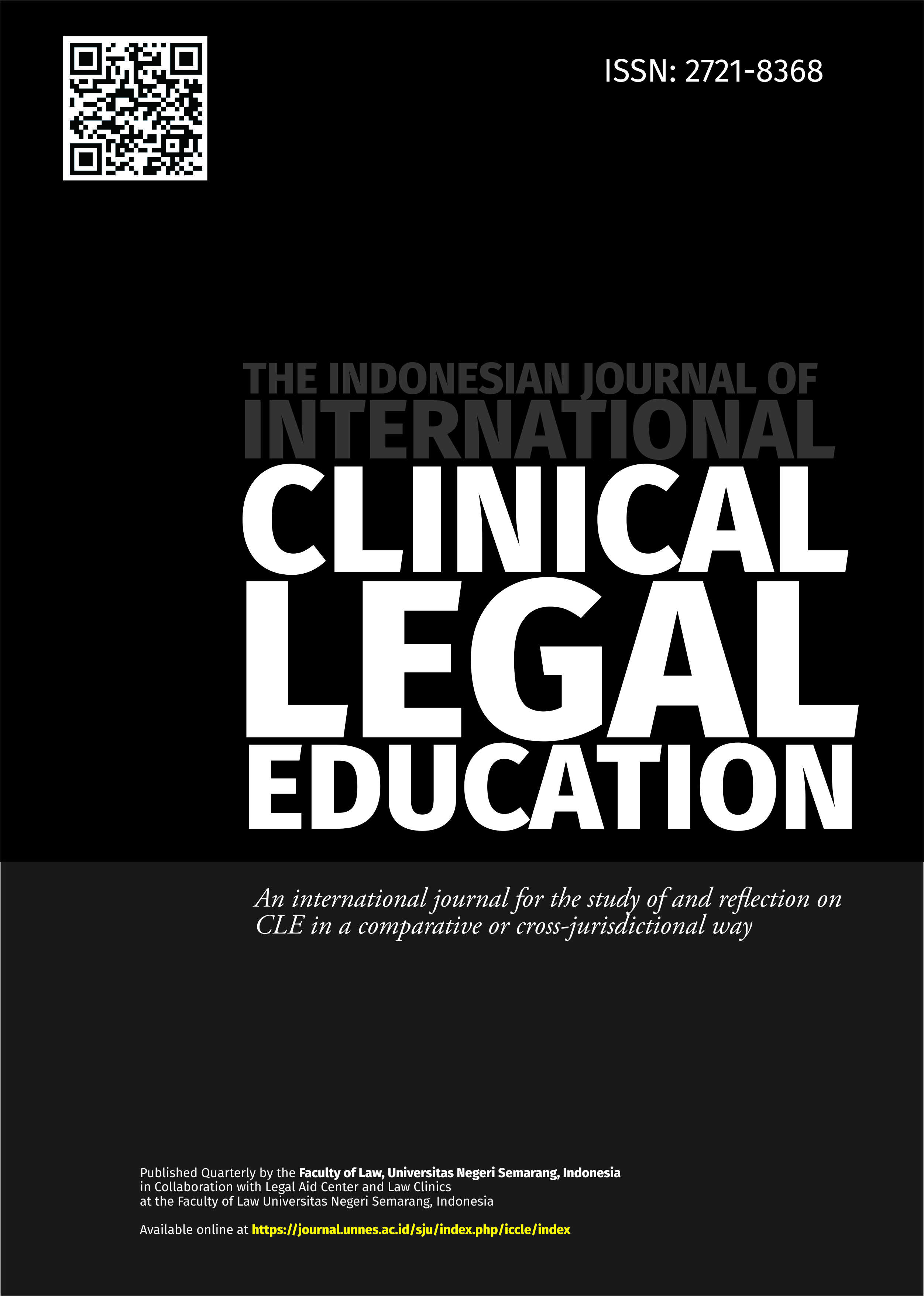Civil Responsibility Model of Coastal State to Oil Pollution in the Sea as the Impact from the Stipulation of Dumping Area by Tanker Ship
Main Article Content
Abstract
The research findings reveal a pluralistic understanding of dumping within the Indonesian Legal System, evident in various laws, including Law No. 17 of 1985 on the Ratification of UNCLOS, Law No. 32 of 2009 on Environmental Protection and Management, Government Regulation No. 29 of 2014 on the Prevention of Environmental Pollution, Ministerial Regulation No. 136 of 2015 on the Second Amendment to Ministerial Regulation No. 52 of 2011 on Dredging and Reclamation, and Ministerial Decree No. 4 of 2005 on the Prevention of Pollution from Ships. Dumping countermeasures are primarily perceived as acts related to dredging and reclamation, identified as contributors to the silting of shipping channels. Notably, Indonesia has not ratified the London Dumping Convention, and there is a lack of a definitive list specifying wastes requiring special arrangements and absolute prohibition within the coastal states' territories. Consequently, compensation has not been prioritized as a state-led measure for marine environmental protection. The state's responsibility, enforced through the State Attorney, necessitates procedural formalities, including a special power of attorney. Collaborative efforts with relevant institutions, particularly the Ministry of Environment and Forestry, are deemed essential. The current landscape in Indonesia reveals overlapping authorities among agencies, leading to conflicting interpretations of civil lawsuit issues related to environmental damages. The proposed model advocates for centralizing environmental priorities within the Ministry of Environment and Forestry, coordinated through the State Attorney, as a strategic step towards addressing these complex issues.
Article Details

This work is licensed under a Creative Commons Attribution-ShareAlike 4.0 International License.
The copyrights of the article in Indonesian J. Int'l Clinical Leg. Educ. is on the Author(s), however, before publishing, it is required to obtain written confirmation from Author(s) in order to ensure the originality (Author Statement of Originality). The statement is to be signed by at least one of the authors who have obtained the assent of the co-author(s) where applicable. This work licensed under a Creative Commons Attribution-ShareAlike 4.0 International (CC BY-SA 4.0). All writings published in this journal are personal views of the authors and do not represent the views of this journal and the author's affiliated institutions.
References
Ariany, Zulfaidah, 2011, Kajian Aspek Hukum Internasional pada Kasus Tumpahan Minyak Kapal Tanker Exxon Valdez (A Study of International Legal Aspect in the Case of the Oil Spill of Exxon Valdez Tanker), Media Komunikasi Ilmu dan Profesi Bidang Kerekayasaan, volume 32. No,1., Available online at http://ejournal.undip.ac.id/index.php/tehnik, ISSN 0852-1697.
Bungin, Burhan, 2005, Metodologi Penelitian Kualitatif (Qualitative Research Methodology), PT Raja Grafindo Persada, Jakarta.
Churchill R.R., and Lowe, A.V., 1995, The Law of the Sea, University Press, Great Britain, Manchester.
Cross, Michael, Hamer, Mick, March, 1992, How to Seal a Supertanker, Improving Ship Design to Prevent Oil Spills, New Scientist, Vol. 133, No. 1812.
Diah Okta Permata, Irma Gusmayanti, Ria Maya Sari, Januari, 2014, Penerapan Peraturan Pembuangan Minyak ke Laut oleh Kapal Tanker dilihat dari Perspektif Hukum Lingkungan Indonesia (The Application of the Regulation of Oil Dumping to the Sea by Tankers Viewed from the Perspective of Indonesian Environmental Law), Jurnal Hukum Lingkungan Vol.1, Issue. 1, Indonesian Center for Environmental Law, Jakarta.
Gold, Edgar, 1997, Gard Handbook on Marine Pollution, second edition, Assuranceforeningen Gard.
Harrison, James, (Edinburgh School of Law), 2009, Regime pluralism and the global regulation of oil pollution liability and compensation, International Journal of Law in Context, Cambridge University.
http://www.tandapagar.com/luas-wilayah-indonesia/, downloaded on 22 October 2016, at 19.20 Indonesian Western Time.
https://www.kejaksaan.go.id/berita.php?idu=0&id=11229&hal=6, 20-09-2016, downloaded on 21 October 2016, at 18.00 Indonesian Western Time
Ibrahim, Johny, 2006, Teori dan Metode Penelitian Hukum Normatif (Normative Legal Research Method and Theory), Bayumedia, Malang.
Imo and Maritime Security; International Maritime Orgnization, 1986, Superintendent of Documents Department of State Bulletin.
Jin Tan, Alan Khee, 2005, Vessel-Source Marine Pollution, The Law and Politics of International Regulation, Cambride University Press.
Konvensi Jenewa 1958 " Convention on The Territorial Sea and Contiguous Zone"
Nikson S., Willem, 2009, Kebijakan Keselamatan Transportasi Laut, Badan Koordinasi Keamanan Laut (Policy on Sea Transportation Safety, the Body of Sea Security Coordination), Jakarta.
Law No. 17 of 1985 on the Ratification of the 1982 UNCLOS. Protocol 1992 (CLC 1969)
Law No. 32 of 2009 on the Protection and Management of the Environment.
Smith, B, 1988, State Responsibility and the Marine Environment, The Rules of Decision, dan G. Handl, 1983, International Liability of States for Marine Pollution, 21 CAN. Y.B. INT’L. L.
The Presidential Decree No. 52 of 1999 on the Ratification of CLC
The Regulation of the Minister of Environment No. 13 of 2011 on Compensation Due to Pollution and/ or Environmental Damage.
The Regulation of the Minister of Transportation No. 58 of 2013 on the Handling of the Pollution in Waters and Harbors
